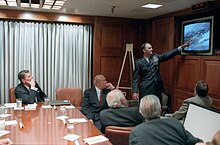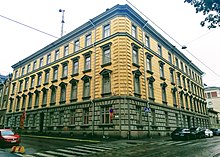National security
Governments rely on a range of measures, including political, economic, and military power, as well as diplomacy, to safeguard the security of a state.They may also act to build the conditions of security regionally and internationally by reducing transnational causes of insecurity, such as climate change, economic inequality, political exclusion, and nuclear proliferation.The concept of national security remains ambiguous, having evolved from simpler definitions which emphasised freedom from military threat and from political coercion.[1]: 1–6 [2]: 52–54 Among the many definitions proposed to date are the following, which show how the concept has evolved to encompass non-military concerns: Potential causes of national insecurity include actions by other states (e.g. military or cyber attack), violent non-state actors (e.g. terrorist attack), organised criminal groups such as narcotic cartels, and also the effects of natural disasters (e.g. flooding, earthquakes).[3]: v, 1–8 [8][9] Systemic drivers of insecurity, which may be transnational, include climate change, economic inequality and marginalisation, political exclusion, and nuclear proliferation.[15] Military capabilities designed for these domains may be used for national security, or equally for offensive purposes, for example to conquer and annex territory and resources.Most states, such as South Africa and Sweden,[16][12] configure their military forces mainly for territorial defence; others, such as France, Russia, the UK and the US,[17][18][13][14] invest in higher-cost expeditionary capabilities, which allow their armed forces to project power and sustain military operations abroad.Infrastructure security is the security provided to protect infrastructure, especially critical infrastructure, such as airports, highways,[19] rail transport, hospitals, bridges, transport hubs, network communications, media, the electricity grid, dams, power plants, seaports, oil refineries, and water systems.[24] The degradation of ecosystems, including topsoil erosion, deforestation, biodiversity loss, and climate change, affect economic security and can precipitate mass migration, leading to increased pressure on resources elsewhere.[3]: 29–33 Romm (1993) classifies the major impacts of ecological changes on national security as:[3]: 15 Resources include water, sources of energy, land, and minerals.[14][27][11][12] For example, Sweden's national security strategy of 2017 declared:"Wider security measures must also now encompass protection against epidemics and infectious diseases, combating terrorism and organised crime, ensuring safe transport and reliable food supplies, protecting against energy supply interruptions, countering devastating climate change, initiatives for peace and global development, and much more.[35][36][37] Others argue that security depends principally on building the conditions in which equitable relationships between nations can develop, partly by reducing antagonism between actors, ensuring that fundamental needs can be met, and also that differences of interest can be negotiated effectively.Among the questions raised are whether and how national security considerations at times of war should lead to the suppression of individual rights and freedoms, and whether such restrictions are necessary when a state is at peace.[47] A lawyer Ashwini Upadhyay filed a Public interest litigation (PIL) in the "Supreme Court of India" (SC) to identify and deport illegal immigrants.National security of Ukraine is defined in Ukrainian law as "a set of legislative and organisational measures aimed at permanent protection of vital interests of man and citizen, society and the state, which ensure sustainable development of society, timely detection, prevention and neutralisation of real and potential threats to national interests in areas of law enforcement, fight against corruption, border activities and defence, migration policy, health care, education and science, technology and innovation policy, cultural development of the population, freedom of speech and information security, social policy and pension provision, housing and communal services, financial services market, protection of property rights, stock markets and circulation of securities, fiscal and customs policy, trade and business, banking services, investment policy, auditing, monetary and exchange rate policy, information security, licensing, industry and agriculture, transport and communications, information technology, energy and energy saving, functioning of natural monopolies, use of subsoil, land and water resources, minerals, protection of ecology and environment and other areas of public administration, in the event of emergence of negative trends towards the creation of potential or real threats to national interests.It is an advisory state agency to the President of Ukraine, tasked with developing a policy of national security on domestic and international matters.For the first time, American leaders dealt with the essential paradox of national security faced by the Roman Empire and subsequent great powers: Si vis pacem, para bellum — "If you want peace, prepare for war."[64]Jack Nelson-Pallmeyer offers a seven-characteristic definition for 'national security state' as where the military and broader national security establishment, e.g., exert influence over political and economic affairs; hold ultimate power while maintaining an appearance of democracy; are preoccupied with external and/or internal enemies; define policies in secret and implement those policies through covert channels.Secretary of State Hillary Clinton has said that, "The countries that threaten regional and global peace are the very places where women and girls are deprived of dignity and opportunity".





National defense (disambiguation)National security (disambiguation)President of the United StatesRonald ReaganUS National Security CouncilLibya bombingPalace of WestminsterLondonconcretecar bombAmerican Englishsecuritydefencesovereign statecitizenseconomyinstitutionsgovernmentmilitary attackterrorismeconomic securityenergy securityenvironmental securityfood securitycyber-securitystatesviolent non-state actorsnarcotic cartelsorganized crimemultinational corporationsnatural disasterspoliticaleconomicmilitarydiplomacytransnationalclimate changeeconomic inequalitypolitical exclusionnuclear proliferationWalter LippmannHarold LasswellArnold WolfersHarold BrownU.S. Secretary of DefenseCharles MaierNational Defence College of Indiacyber attackterrorist attackorganised criminal groupsmarginalisationphysical securityborder securitycyber securityelements of national powersecurity policiesNational Security CouncilNational Security Advisormilitary capabilitiescyberspacepsychological operationsElements of national securityMilitary securitymilitary aggressionnon-state actorsexpeditionary capabilitiesproject powermilitary operationsBorder guardCritical infrastructurePunavuoriHelsinkiinfrastructureairportshighwaysrail transporthospitalsbridgestransport hubselectricity gridpower plantsseaportsoil refinerieswater systemssabotagecontaminationFederal Protective ServiceBritish Transport PoliceAmtrak Police2008 Mumbai attacksInformation warfareCyberattacks on Estoniacyberattacks during the 2008 South Ossetia warNatural disasterEconomic effects of Hurricane KatrinaComputer securitycomputerscomputer networksInternetStuxnetIranian nuclear programmePolitical securityBarry BuzanOle WæverJaap de Wildeinternational lawlaws of warinternational political institutionsnegotiationhuman securityinternational relationsnation stateThe United StatesDeveloping countriesecosystemsbiospherediversity of life-formstopsoil erosiondeforestationbiodiversity lossmass migrationagricultureglobal warmingloss of biodiversitydisputes over water scarcity in the Middle EastMexico
